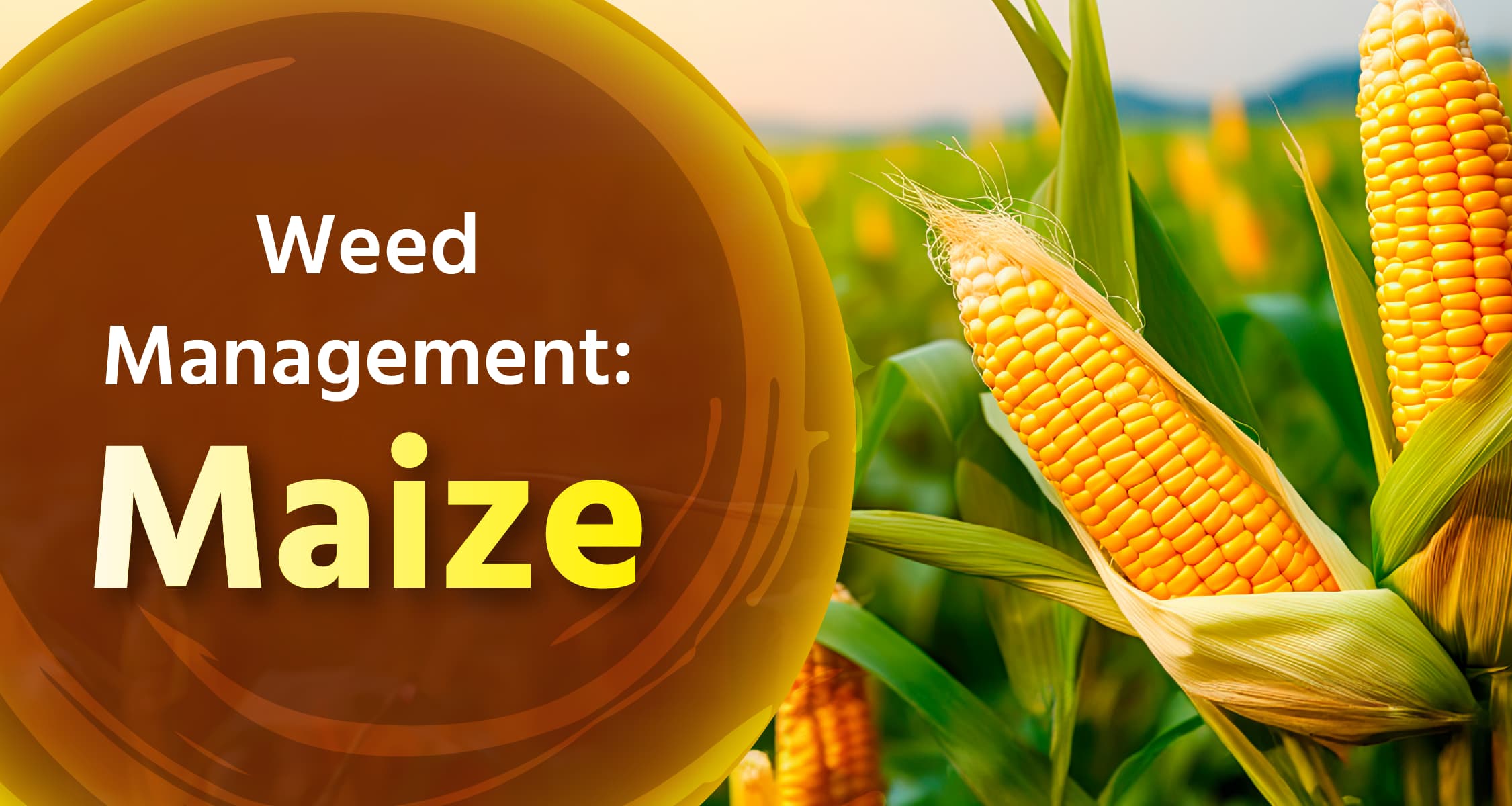Weed Management for Maize Crops

Weeds can rapidly absorb nutrients and water, leading to a reduction in crop yield by up to 35%. In the Rabi season, maize crop faces more problems like Little seed canary grass, canary grass, wild oats, bathua, wild senji, swine grass, etc. Hence, controlling these weeds can be very vital for a healthy harvest. Various chemical herbicides/weedicides and different methods can be adopted for controlling these weeds.
Damage caused by weeds in maize crops
- Affecting the growth of plants: Weeds can affect the maize crop heavily which can hinder the growth. Hence, final maize production deteriorates causing financial losses for farmers.
- Reduction in quality: Weeds can affect the maize crop adversely and deteriorate its quality of harvest. The sweetness (taste) of corn may also be affected.
- Reduction in yield: If weed growth is not controlled in the fields for maize crops, the yield of the crop gets reduced by 35 percent. This can adversely affect the financial stability of the farmers.
- Diseases and pests: Many types of fungi and pests grow and proliferate on weeds that destroy the main crop.
- Economic loss: Due to low yields and adverse quality of the crop, they do not get sold at a reasonable price in the market. This affects the farmers heavily in terms of financial stability and their plans for cultivation.
- Labor requirement: Labor is required more in the weeding process and spraying herbicides/weedicides to control them.
- Increase in costs: Using herbicides/weedicides increases the costs of cultivation. The initial costs increase as they buy various herbicides/weedicides for specific weeds that can affect their crops.
Various methods of controlling weeds in maize crops
Control of weeds through plowing and weeding
- Do deep plowing in the field before sowing. This will destroy the weeds already present in the field.
- After that, carry out weeding to control weeds.
Control of weeds through mulching
- Mulching is a good option to control weeds in maize crops.
- This process not only helps in weed control but is also effective in soil conservation and maintaining moisture in the soil for a longer period.
Controlling of weeds through herbicides/weedicides
- One day after sowing the crop, spray 400 grams of Atrazine 50% WP (DeHaat- Atraforce) mixed in 150 to 200 liters of water per acre.
- 40 days after sowing the crop, spray Tembotrione 42% SC (DeHaat- Tronex) at the rate of 114 mg per acre.
- Use 300 ml Topramzone 33.6% SC (BASF- Tynzer) per acre of field.
- Use 36 gm of Halosulfuron Methyl 75% WG (Dhanuka Sempra) per acre of field.
Things to keep in mind while applying herbicides/weedicides
- Avoid using the same herbicide repeatedly. Repeated use of the same chemical may cause weeds to become tolerant/resistant to it.
- Use chemical herbicides only once in a crop.
- Read and follow the directions on herbicide packets.
- While using weedicide/herbicide, there should be moisture in the soil. This helps the medicine reach the crop properly.
- Weedicide/herbicide should be sprayed in the correct quantity to avoid adverse effects on the crop.
- Any kind of insecticide or fungicide should not be mixed with herbicide. This may reduce the effect of herbicides/weedicides.
- Herbicides/weedicides contain many types of harmful chemicals. Its excessive use can be harmful to the soil and environment.
What methods do you use to control weeds in the maize crop? Share your answers with us in the comments. If you find the information provided in this post useful, don't forget to like and share it. For more information on weed control, follow the 'Weed Management' channel now.
Frequently Asked Questions (FAQs)
Q: Which herbicide/weedicide can be used for weeds in the maize crop?
A: The choice of herbicide/weedicide depends on the type of weeds present in the field, the stage of growth of the maize crop, and the type of soil. To control weeds in maize, herbicides like atrazine, and pendimethalin are generally used. However, one must carefully follow the instructions given on the herbicide packet and apply herbicide in appropriate quantity and at the right time to avoid any damage to the maize crop. It is also advisable to consult an agricultural expert before using any herbicide.
Q: What precautions should be taken while spraying herbicides/weedicides?
A: Many types of harmful chemicals are present in herbicides, which have adverse effects on human health. Therefore, while spraying herbicide, cover your face properly with a cloth. Spray them while wearing gloves. Clean hands thoroughly after spraying these chemicals. Do not throw the herbicide/weedicide packets randomly as these empty packets can be harmful to animals.
Q: Which are the broad-leaf weeds?
A: Bathua, Senji, Asthma Weed, Hirankhuri, Kandai, Wild Spinach, Wild Peas, Krishna Neel, etc. are some of the major broad-leaf weeds. These weeds grow in almost all areas of India.
Q: How is the weeding process carried out?
A: Weeding is done to control the weeds growing in the field. A spade, hoe, or harrow is used for weeding. In this process, weeds are removed by uprooting them or by cutting them near the upper surface of the soil. This process requires more time and labor. Therefore, this method is generally used in small fields than in large fields.
Q: When should herbicides/weedicides be sprayed?
A: These chemicals should be sprayed in the morning or evening. There should be adequate moisture in the soil at the time of spraying herbicides/weedicides.
Please login to continue

Get free advice from a crop doctor
